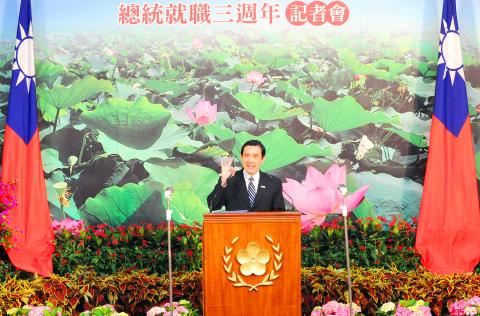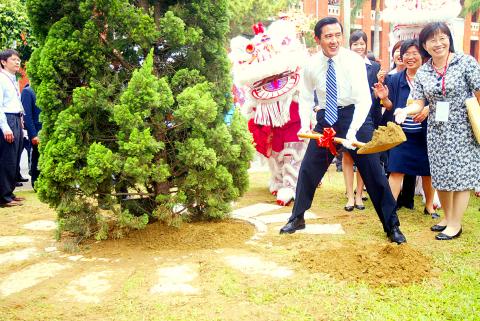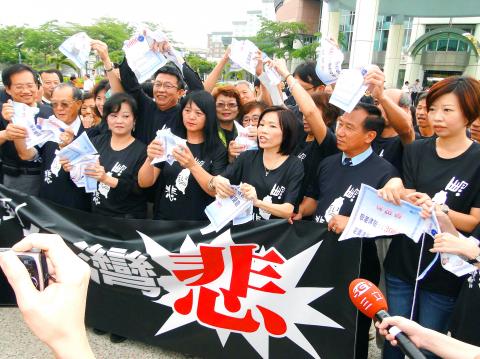President Ma Ying-jeou (馬英九) yesterday promised to achieve more progress in terms of the country’s sovereignty, human rights and environmental protection.
In a 20-minute speech at the National University of Tainan to mark his third year in office, Ma said the government has the responsibility to work for the good of current and future generations.
“We should not narrow the opportunities for the next generation, but rather should lay a good foundation for its well-being,” he said. “This is transgenerational justice.”

Photo: Huang Chih-yuan, Taipei Times
“Your future is Taiwan’s future. The government’s responsibility is to build an environment that allows you to use your talent,” he said, addressing the nation’s young people.
Today is the third anniversary of Ma’s inauguration.
Holding the speech and a press conference in Greater Tainan was seen as a re-election ploy because the area has long been a stronghold of the Democratic Progressive Party (DPP).

Photo: CNA
Ma, who will be seeking re-election in January, has long been accused by his critics of hurting Taiwan’s sovereignty and interests in his dealings with China, but he defended his policy of building better ties with China, saying that none of the 15 agreements signed between the two sides of the Taiwan Strait over the past three years had put Taiwan at a disadvantage.
“It is our responsibility to help future generations grow and develop in a peaceful cross-strait environment,” he said.
Despite improved cross-strait relations, Ma said, he has continued to urge the US to sell the “necessary defensive weapons” to Taiwan.

Photo: Hung Jui-chin, Taipei Times
“Only by increasing Taiwan’s power to defend itself will we be able to maintain a balance across the Taiwan Strait,” he said. “Only by doing so will Taiwan gain confidence in the course of its interactions with the mainland.”
Ma said that his administration has lodged strong protests with Beijing over any denigration of Taiwan’s sovereignty, including the recent case involving a memo issued by WHO Director-General Margaret Chan (陳馮富珍) in September last year. The memo asked its recipients to refer to Taiwan as a “province of China.”
Ma said he had also asked Department of Health Minister Chiu Wen-ta (邱文達) to protest the letter at this week’s meeting of the World Health Assembly (WHA), the WHO’s governing body.
When things matter to national sovereignty and Taiwan’s dignity, “Taiwanese are not afraid of anything,” Ma said, switching to Hoklo (also known as Taiwanese.)
Ma said Tainan Airport will become the ninth in the country to accommodate direct flights to and from China, starting with charter flights this summer.
He also listed several policies he said would benefit southern Taiwan. The government has invested or plans to invest a total of NT$744.7 billion (US$25.8 billion) in construction projects in southern Taiwan, he said, including an underground railway and creative cultural park in Greater Tainan and a NT$263.2 billion project to make Greater Kaohsiung an multi-purpose port and a major industrial city.
Ma said not everyone in the country was aware of his administration’s efforts to make Taiwan a better place to live.
“That’s why I’ve been on the road, meeting people, especially those who will become eligible this year to vote,” he said in response to a reporter’s question on how he would woo first-time voters.
Meanwhile, more than 100 people protested outside the Greater Tainan Council against Ma’s presidential record.
The rally, organized by the DPP’s Tainan branch and its Greater Tainan Council caucus, featured demonstrators clad in black shirts singing songs and holding banners proclaiming how painful their lives have been under the Ma administration.
The caucus members accused Ma of failing to fulfill many of his election promises.

Chinese Nationalist Party (KMT) Chairman Eric Chu (朱立倫), spokeswoman Yang Chih-yu (楊智伃) and Legislator Hsieh Lung-chieh (謝龍介) would be summoned by police for questioning for leading an illegal assembly on Thursday evening last week, Minister of the Interior Liu Shyh-fang (劉世芳) said today. The three KMT officials led an assembly outside the Taipei City Prosecutors’ Office, a restricted area where public assembly is not allowed, protesting the questioning of several KMT staff and searches of KMT headquarters and offices in a recall petition forgery case. Chu, Yang and Hsieh are all suspected of contravening the Assembly and Parade Act (集會遊行法) by holding

PRAISE: Japanese visitor Takashi Kubota said the Taiwanese temple architecture images showcased in the AI Art Gallery were the most impressive displays he saw Taiwan does not have an official pavilion at the World Expo in Osaka, Japan, because of its diplomatic predicament, but the government-backed Tech World pavilion is drawing interest with its unique recreations of works by Taiwanese artists. The pavilion features an artificial intelligence (AI)-based art gallery showcasing works of famous Taiwanese artists from the Japanese colonial period using innovative technologies. Among its main simulated displays are Eastern gouache paintings by Chen Chin (陳進), Lin Yu-shan (林玉山) and Kuo Hsueh-hu (郭雪湖), who were the three young Taiwanese painters selected for the East Asian Painting exhibition in 1927. Gouache is a water-based

Taiwan would welcome the return of Honduras as a diplomatic ally if its next president decides to make such a move, Minister of Foreign Affairs Lin Chia-lung (林佳龍) said yesterday. “Of course, we would welcome Honduras if they want to restore diplomatic ties with Taiwan after their elections,” Lin said at a meeting of the legislature’s Foreign Affairs and National Defense Committee, when asked to comment on statements made by two of the three Honduran presidential candidates during the presidential campaign in the Central American country. Taiwan is paying close attention to the region as a whole in the wake of a

OFF-TARGET: More than 30,000 participants were expected to take part in the Games next month, but only 6,550 foreign and 19,400 Taiwanese athletes have registered Taipei city councilors yesterday blasted the organizers of next month’s World Masters Games over sudden timetable and venue changes, which they said have caused thousands of participants to back out of the international sporting event, among other organizational issues. They also cited visa delays and political interference by China as reasons many foreign athletes are requesting refunds for the event, to be held from May 17 to 30. Jointly organized by the Taipei and New Taipei City governments, the games have been rocked by numerous controversies since preparations began in 2020. Taipei City Councilor Lin Yen-feng (林延鳳) said yesterday that new measures by